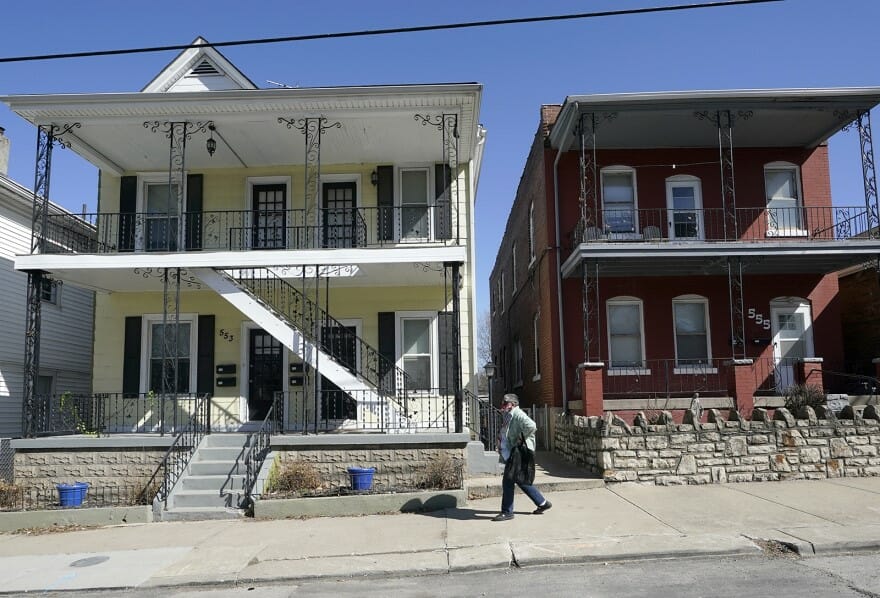- Home | News & Issues |
- Local Governments Ponder Property Tax Levies, as Questions Swirl About Break for Seniors
Local Governments Ponder Property Tax Levies, as Questions Swirl About Break for Seniors Property Tax Politics
Published October 5th, 2023 at 6:00 AM
Above image credit: City Hall and the Jackson County Courthouse at the center of the downtown Kansas City skyline. (Luke X. Martin | KCUR 89.3)Schools, libraries and other local units of governments have been busy pondering the impact of soaring property tax assessments.
Bills reflecting those decisions will soon be showing up in local mailboxes.
Although it’s too late for this year, Jackson County seniors have been told they will be spared from the financial burden of soaring property assessments starting in 2024.
The county legislature acted on a new Missouri law allowing Missouri’s 114 counties to freeze assessments at 2023 rates for qualifying homeowners 65 and older.
The county’s decision was met with applause, especially from seniors on fixed incomes who feared being taxed out of their homes.
Even so, questions are being raised about how the new state credit for seniors would be implemented. Rather than relying on a county-by-county approach, some advocates are beginning to push for a less cumbersome and more inclusive statewide solution.
The language of the Missouri law, SB 190, is unclear. Legal challenges are expected.
The new law was sponsored by Sen. Tony Luetkemeyer, a Republican of Parkville, and state Rep. Ben Baker, a Republican of Neosho. But it received bipartisan support.
Critics argue the legislation was passed in a rush, with politicians eager to offer help to older residents.
“The governor, and even some counties are doing this in the name of helping seniors,” said Laura Loyacono, an associate with Public Progress. “But really, it’s not helping seniors out.”
The urge to help seniors is fueled by a tumultuous reassessment cycle.
Jackson County property assessments have risen by an average of about 40% since 2021, the last time property values were analyzed. The county is still working through the more than 54,000 appeals of property tax assessments filed this year.
Three cities, Lee’s Summit, Blue Springs and Independence, also have sued the county, arguing that assessments were mailed late, didn’t take new construction into account and were higher than the law allows.
The county’s effort to help seniors wasn’t given enough time for debate, some say, which might have flagged concerns that are now being raised.
Notably, the new law only applies to homeowners and those who pay Social Security. It doesn’t address seniors who rent and see higher bills as landlords pass through rising property tax bills.
It also has no income caps, a concern raised by Jackson County Executive Frank White, Jr. who didn’t support the county’s implementation of the state law.
Some argue the very wealthy can also have their taxes frozen, although the county measure is only for people with homes valued at less than $550,000.
One result would be undercutting libraries, senior centers and schools that depend on tax revenue for funding, Loyacono said.
Moreover, to grant the freeze, counties must be able to track the age of the property owner, along with their income, with the property in question.
Most counties do not keep that type of data, Loyacono said, although Jackson County does.
A related concern is the prospect of fraudulent filings.
An unscrupulous person could take advantage of the credit by listing a senior person, say an older relative, as the rightful owner and then reap the benefit of a frozen tax rate.
“It’s just confusing,” said Jim Staley, community relations and planning director for the Mid-Continent Library. “We are hoping there is some clarification in this legislative session.”
Meanwhile, local government budgets and levies must be set.
For 2023, many of the more than 80 taxing entities in Jackson County are rolling back their levies.
This is happening either by board or trustee choice to offset the impact on taxpayers of the higher assessments, but it is mostly due to the requirements of the Missouri Constitution.
The Hancock Amendment, in place since 1980, limits how high tax levies can rise without voter approval.
Of the 12 school districts in Jackson County only two — Raytown and Kansas City — are holding their levy rates steady for 2023.
Both the Kansas City Public Library and the Mid-Continent system also voted to roll back their levies.

As levies are adjusted for next year, there are still concerns about the impact of rising property values and how Missouri’s aging population will manage going forward.
“A more targeted approach to meaningful property tax relief, I think, is warranted,” Loyacono said.
Statewide Circuit Breaker
Advocates for seniors are pushing a different solution.
The top legislative priority for the AARP is to improve the “circuit breaker property tax credit.”
Policy experts are gearing up to make their case to the Missouri General Assembly.
Expanding the Missouri Property Tax Credit is seen as a way to give relief to more people, including renters and the disabled, without harming the budgets of public schools, which rely heavily on property taxes for funding.
It doesn’t create a new law. It expands a measure in place in Missouri since 1973, designed to keep pace with rising inflation. The circuit breaker property tax credit hasn’t been adjusted since 2008.
More than 131,000 Missouri households currently benefit from the tax credit, according to Missouri Budget Project.
The credits are tied to the amount of property tax paid and income.
Around the nation, 31 states have such an option. And 22 states, including Missouri, also include renters.
In 2021, there were 13,960 claims for the tax credit in Jackson County (7,250 from renters) at an average benefit of $632.
In Missouri, the maximum credit is $750 for renters and $1,100 for homeowners.
The Missouri Budget Project is advocating for those amounts to increase to $1,055 for renters and $1,550 for homeowners.

One group that is left out of the current law is teachers who have pensions, not Social Security, said Lindsey Baker, research director of the Missouri Budget Project.
Counties must take advantage of SB 190 for it to apply, and it’s unclear if all taxing entities, from fire districts to water districts, are subject equally to the new law.
“The circuit breaker would get that money back right away (to taxpayers), and it would be for every county in the state automatically,” Baker said.
The goal is to convince the legislature to expand income eligibility, to continue including renters who wind up paying more when landlords pass through higher tax assessments, and to increase the credit amount and index it to adjust to inflation.
“We know that it’s not just homeowners who are being impacted by these property tax increases,” Baker said.
Only people with incomes below $14,300 currently qualify for the maximum credits.
Next year’s legislative session is considered best because Missouri recently entered a new fiscal year with an $8 billion budget surplus.
Schools, Libraries
Public school districts rely on property taxes to fund building maintenance, items bought for classrooms, teacher salaries and more.
Jackson County collects about $1.3 billion in taxes for more than 80 units of government, including cities, schools, fire departments and libraries.
It provides estimates of tax revenues, based on the assessments, so the various districts and others can set their budgets.
But the high number of appeals has made county estimates less reliable.
“We overall are projected to see an almost 12% increase due to the higher assessments,” said Mindy Hampton superintendent of Oak Grove R-VI School District.
The area is seeing steady growth, with new single-family homes and multi-family developments being built, Hampton said.
Oak Grove’s tax levy for 2023, due to the Hancock Amendment, was rolled back from 5.1582 per $100 of assessed valuation to 4.6876.
“It’s still estimated because the appeals are still out,” Hampton said. “It’s always very preliminary. But this year, it is extra special preliminary.”
She said the district, like others, routinely makes budget amendments throughout the year.
In part, that is because the school year and the state’s fiscal year don’t coincide with the timing of the county assessments, let alone a high number of appeals.
In 2024, the additional wrinkle of possibly freezing the assessments of seniors could be at play.

Kansas City Public Schools voted to hold its levy steady at 4.9599 per $100 of assessed valuation, arguing that it has too much deferred maintenance of its buildings to do otherwise.
The district is not subject to the Hancock Amendment because its levy was set by a federal judge in 1995 during the district’s long-running desegregation case.
As a result, the Kansas City district anticipates receiving almost $33 million more in revenue due to property assessment increases.
Until the new levies were set, Kansas City Public Schools could argue that its rate was the second lowest in Jackson County, after Grain Valley. The district hasn’t gotten a voter-approved increase since 1969.
But with the latest rollbacks due to the Hancock Amendment, that’s no longer true. Center, Lee’s Summit, Lone Jack and Oak Grove school districts now also have lower levies.
Three people testified before the Lee’s Summit Board of Education as it took up plans in late September to lower the tax levy from $5.3089 to $4.7112 per $100 of assessed valuation, said Nathan Holder, assistant superintendent of business services.
One person had a question about a debt service transfer. The other two were worried about future budgets, given the recent high assessments.
Without relief, it’s a plea that districts will likely continue to hear as the population ages.
Missourians aged 65 or older are expected to be more than 20% of the population by 2030.
“They just encouraged us to look for ways in the future to manage expenses in a way that would ultimately benefit the rate,” Holder said.
Mary Sanchez is senior reporter for Kansas City PBS/Flatland.
More on Flatland
Jackson County Freezes Property Taxes for Seniors After Controversial Assessments Thousands of senior citizens in Jackson County will soon be eligible for a property tax break, following this year’s most recent assessments.
Tags: Government • Jackson County Legislature • Kansas City Public Library • Kansas City Public Schools • politics • property taxes
Like what you are reading?
Discover more unheard stories about Kansas City, every Thursday.
Thank you for subscribing!
Check your inbox, you should see something from us.
Ready to read next
Top Dallas Retail Operator Wants to Buy Country Club Plaza
Read StoryRelated Stories
As Few as 1 in 5 Voters Could Defeat Initiative Petitions Under Missouri Senate Proposal
The legislation set for debate in the Senate would require a majority vote in 82 state House districts and a statewide majority to approve constitutional amendments.
by Rudi Keller, Missouri Independent | 02-05-2024



